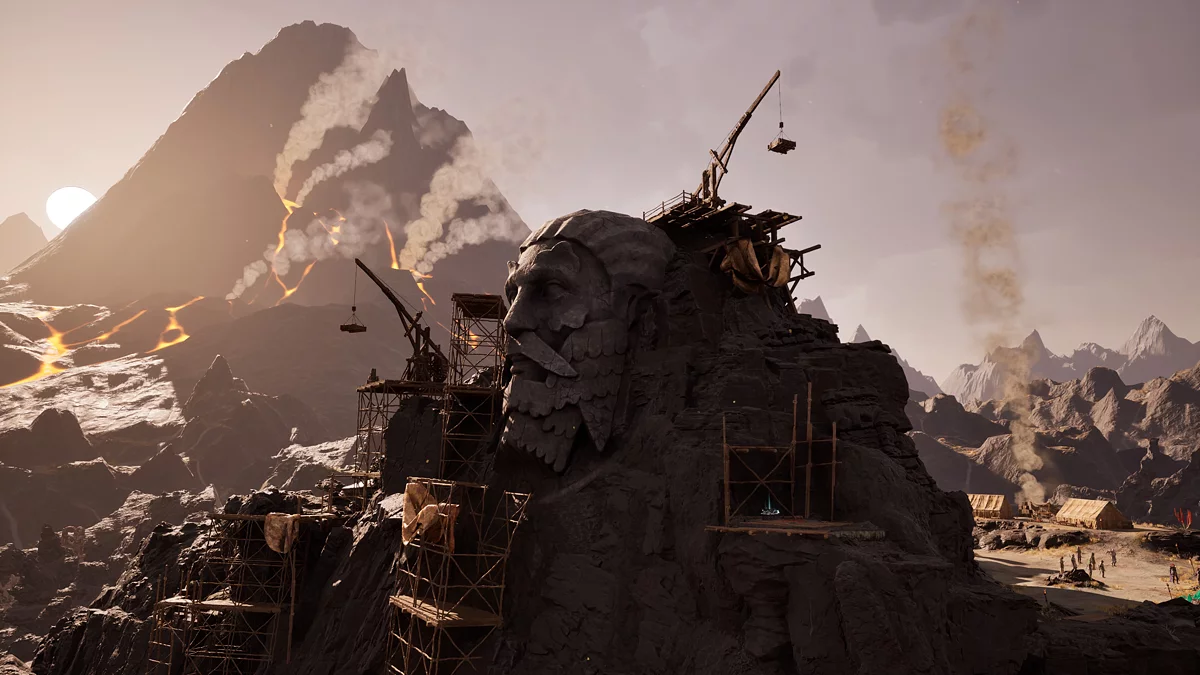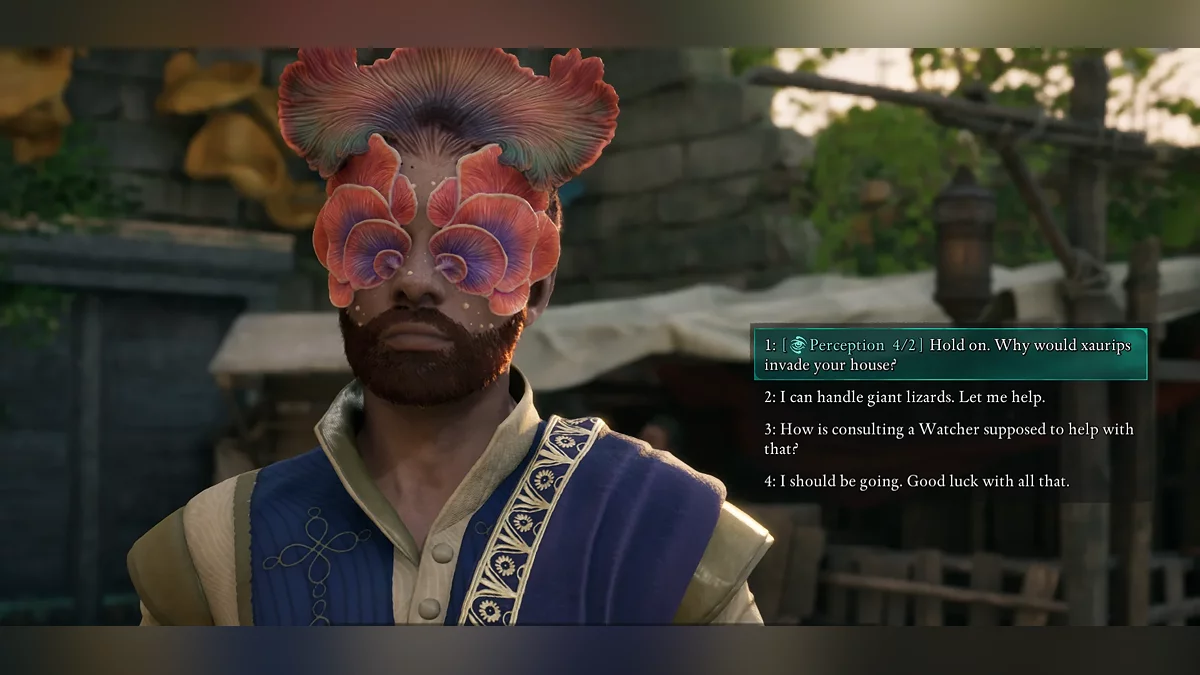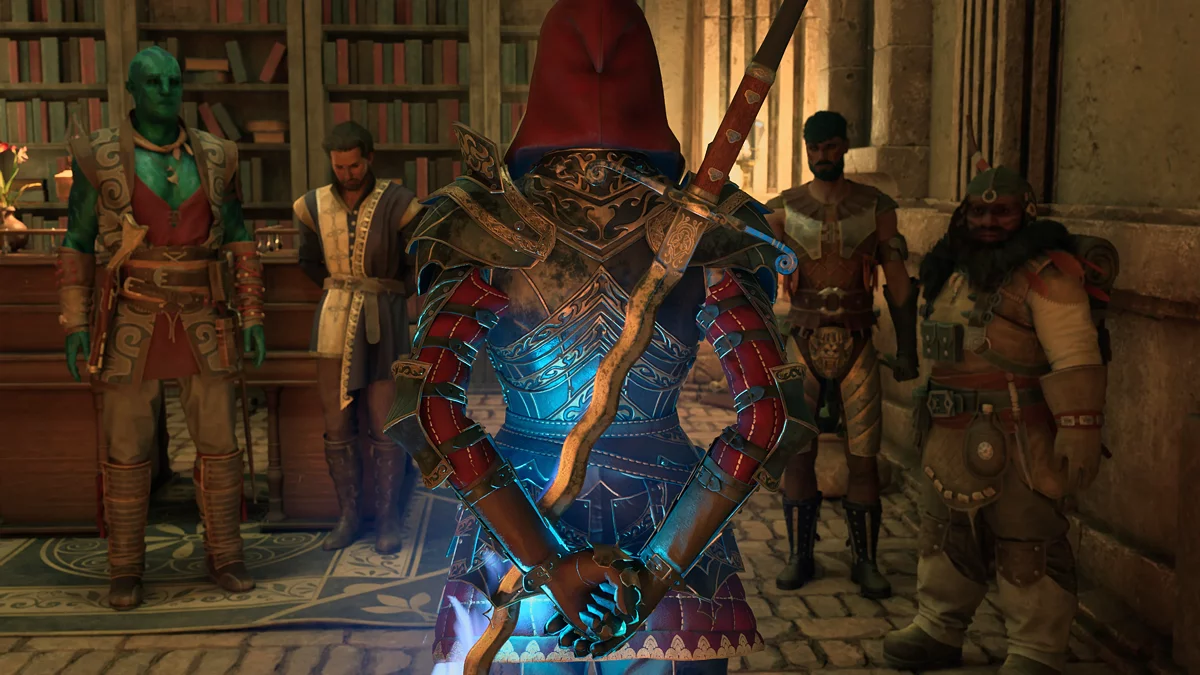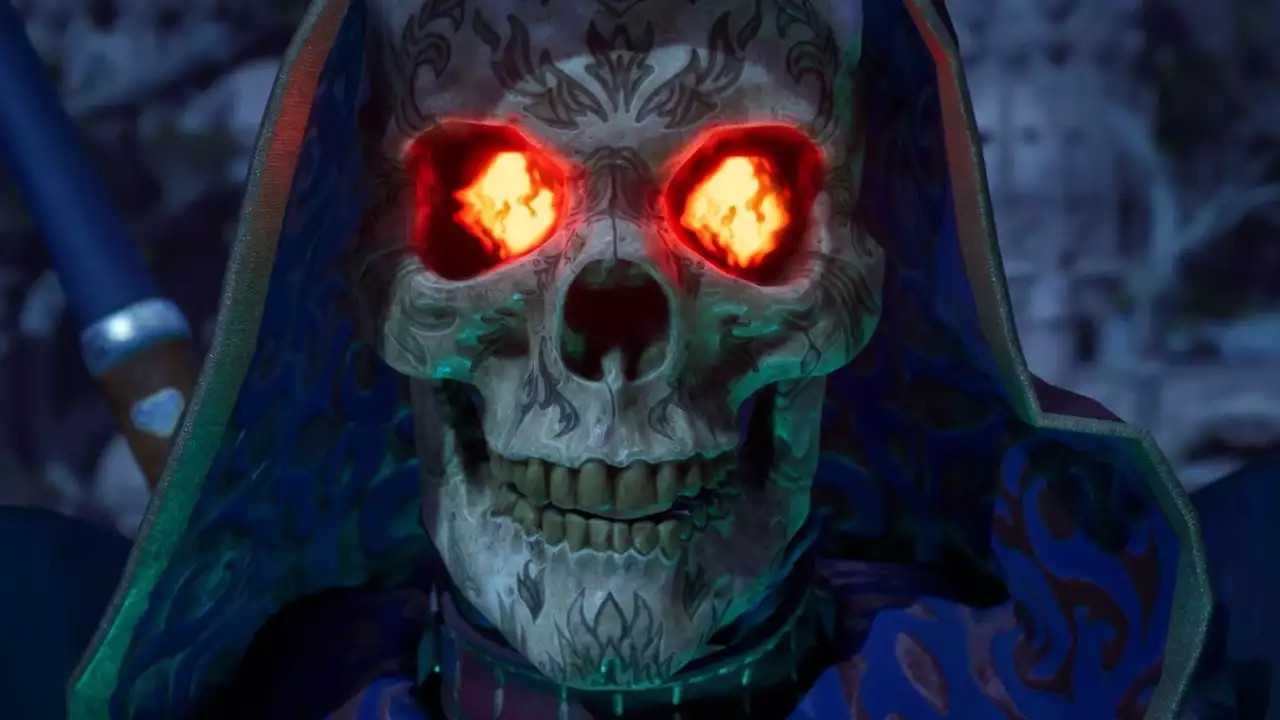Avowed is one of the main hits of Xbox Game Studios in 2025. The game was positioned as a AAA-RPG from one of the most renowned studios — Obsidian Entertainment, whose competence few doubted. The initial trailers showcased a "Skyrim on steroids" and a multitude of intriguing mechanics, and the release was met with a flurry of compliments from foreign publications. The new release is selling excellently, gathering high scores and seemingly should take its rightful place among such giants of the genre as Baldur's Gate 3, Kingdom Come: Deliverance 2, and the same The Elder Scrolls 5: Skyrim. But is everything really that wonderful? We have already written our first impressions after 10 hours of gameplay and were left more puzzled than delighted. Now, it's time to break down the game into its components and deliver the final verdict.
In a Certain Kingdom
If you read the first article, you already know that the plot of Avowed unfolds in the same world as Pillars of Eternity (another hit from Obsidian Entertainment). However, the developers have repeatedly stated that knowledge of "Pillars of Eternity" is not required. There will be a few Easter eggs for old fans, but that's about it. In reality, things are a bit different. Right from the start, you're bombarded with a ton of terms, names, gods, and other fantasy elements that can instantly make you feel lost. For the curious, there's a special option in the dialogue menu that allows you to read a brief description of a particular place, name, or person. Sometimes, a couple of these descriptions might be needed in one conversation, but more often five or even six. Meanwhile, all the characters speak to your protagonist as if you're already well-versed in all the nuances of this world, understanding references and jokes at a glance.
The good news is that the infamous brief really helps, and many things can be understood through experience, so to speak. But for those who just decided to launch a new RPG with a beautiful cover, it will be tough. The volume of information doesn't decrease as the game progresses, so be prepared to read an encyclopedia throughout the game. Yes, just like in some Sid Meier's Civilization.
This brings to mind the recent Kingdom Come: Deliverance 2, which also had a lot of specific names and designations, but there the developers managed to organically weave the terminology into the gameplay, all important characters were introduced to Henry personally and were well-remembered in the end. And this in a sequel to a historically-realistic RPG! Despite the rather trivial plot setup and seeming detachment, you can't say the same about Avowed.
The story is simple, if not banal. The protagonist belongs to a special kind of godlike. It so happened that some children are chosen by the gods while still in the womb, making them practically personal servants by force. The touch of a god gives various powers but also affects appearance. The deities speak to their "children," give them tasks, and exploit them in every way. By the start of the game, there are only a few godlike left, and only one like the main character, making him "special among the special." Yes, just like that, straightforwardly.
Our protagonist doesn't have golden skin, horns, or hooves; he is marked by mushrooms. Needless to say, all the options of fly agarics on the face in the character editor look disgusting. As we wrote in the first impressions, players can disable the display of various growths for themselves, but other NPCs will continue to see them. Because of this, it's hard to immerse yourself in the role of the hero. Nobody wants to perceive themselves as a guy with sprawling mushrooms instead of eyes.
What god touched the child is unknown. Meanwhile, the celestial mushroom doesn't speak with its chosen one, doesn't give powers, and the new growths don't die off. This continues for many years until our godlike becomes the emperor's emissary. The adventure starts from this point. The hero sets off to the mysterious island of "Living Lands" to find out the reasons for, attention, the mushroom plague. If you're over five years old, it's pretty easy to put two and two together. And the godlike's abilities begin to grow rapidly. However, almost until the very end, the scriptwriters make mysterious faces and prepare the player for an "unexpected twist." What kind? Guess for yourself.
Right after the start, the emissary's ship is sunk, and we face the manifestations of a disease called the "Dream Blight." Mechanically, the infection resembles something between the infection from The Last of Us and a zombie apocalypse. In the early stages, the carrier is tormented by nightmares about mushrooms growing directly from the body, the second stage is aggression, loss of control, and memory. And then — practically a living corpse that doesn't control its actions. The problem is that the Dream Blight affects not only living organisms but also the dead, nature, and the environment. Moreover, it's unknown how it spreads. Because of this, the entire ecosystem of the Living Lands is rapidly heading toward catastrophe.
Arriving at the local port with another telling name, Paradis, the emissary finds himself in a conflict typical of mediocre fantasy. The people of the Living Lands are used to existing in chaos, but the empire forcibly imposes culture and prosperity. We see two obvious forces, unexpectedly referencing the European colonization of America. However, in Avowed, the contrast is toned down, so the indigenous population consists mainly of escaped criminals, deserters, and refugees of dubious appearance. All of them, in their customs and way of life, are almost indistinguishable from the imperials, so the intensity of the confrontation is somewhat reduced.
We are, of course, told that imperial paladins are rampaging, people are starving, and freedom is being oppressed, but there will be no specific examples. No one is hanging on poles, taverns are full of people, and the poor live outside the city walls, but why exactly is a mystery. This is the first of many signals pointing to the overall artificiality of what is happening.
Although at times the story is truly engaging. While you aren't given specifics, figuring out what's happening is interesting. Many things are obvious, but the local issues are often presented with creativity. If you look past the cardboard-like environment, all these divine squabbles, unknown diseases, and the peculiarities of the Living Lands are intriguing. This, of course, isn't enough for a large 100-hour RPG, but Avowed isn't actually that big.
Despite the fact that the emissary is supposedly carrying out the emperor's will, the hero has enough freedom in the decisions they make, including the ability to go against their own. The main source of all the troubles of the Living Lands' population is Inquisitor Ludwin. And believe me, as soon as you see her, you'll immediately know who the final battle will be with. It's not a spoiler to say that she is, for a moment, a living skeleton with fire in her eye sockets. The decision, of course, is up to the player, but you'll be hard-pressed to find a more caricatured and all-consuming evil antagonist.
You have probably already realized that you will have to choose between your own and others, progress mixed with control, and a love of freedom inextricably linked with nature. We've seen all this in one form or another countless times. Even the overall environmental theme seems overused.
And since we're talking about choosing sides, it's worth mentioning a few words about variability. It's present here, but not to the extent you would expect from a new "Obsidian" game. The level of quests ranges from very mediocre to cool, and the possible solutions to situations are just as varied. In some cases, you decide to help refugees or simply turn them over to the guards, while in others, you can resolve the issue in five different ways, with direct confrontation being just one of them.
However, there are also completely comical situations where the game strongly nudges you toward what it considers the only correct choice. For example, at the very beginning, a girl asks you to deal with anthropomorphic lizards that have taken over her home. During the cleanup, it turns out that one of them has a part of the girl's soul (don't ask).
You can then encourage the client to befriend the small dinosaur or choose a more aggressive approach to prevent any peaceful resolution. And here's where the real circus begins, with your companions, then the girl herself, and even the dialogue options hinting at which decision is "bad." It looks clumsy and cheap. If you ultimately insist on your choice, the quest will be marked as failed, even though in other circumstances the girl would give you a nice ring. There are plenty of similar examples. Before you meet the inquisitor, literally everyone tells you how terrible she is. You'd think the player should make the decision themselves, but there's no alternative position at all.
The dialogues aren't all smooth either. They can be considered a plus for Avowed, but only barely. Throughout the adventure, you'll be doing a lot of talking. Most of these conversations are frankly drawn out and don't provide useful information, or conversely, dump a load of lore on you. The charm lies in the response options.
Almost always, you can mock a strange situation or react exactly how you want — there will be a fitting line. In every exchange, there's an option to recall your emissary status, express astonishment at the characters' stupidity, or be sarcastic. The only catch is that witty humor or rudeness has very little impact on the dialogue line. You almost always get more or less the same information with a couple of differing phrases. Even the lines that depend on your backstory or stat characteristics don't save the situation.
However, the developers unexpectedly integrated side quest completion into the main storyline. Occasionally, your attention to side tasks provides new information or an argument in a dispute. In other cases, specific responses in a conversation only create a strange sense of absurdity when you reply sharply, expecting confrontation, but receive a standard response as if the witty remark went unnoticed. After the first chapter-location, such situations become less frequent, but the first impressions are still disheartening.
A special mention goes to the "memory places." As soon as the emissary arrives on the island, the Voice of the mushroom god settles in his head. While traveling, you will occasionally find memory fragments. It seems like the perfect moment to integrate lore into the events more or less interestingly, but that's not the case. Interacting with the memory, we don't see beautiful cutscenes, just a slideshow of images telling the life story of some distant predecessor of the emissary. The funniest part is that the Voice will regularly clarify what happened since it has already forgotten the details. And the player didn't remember them either! Just think about it. We must craft the backstory of characters unknown to us, describe their personalities and decisions, completely devoid of the context of events. Meanwhile, each of your responses affects the Voice.
In a narrative and role-playing sense, Avowed resembles a very poor Dungeons & Dragons campaign, where players are promised freedom and attention to their decisions, but in reality, we have a linear adventure with minimal branching. You can eventually enjoy the story, but only if you make an effort and endure the long first chapter, and not everyone will agree to that. Moreover, it's worth understanding in advance what kind of RPG you're in for. If you're looking for an opportunity for strong role-playing, Avowed is definitely one to skip.
Not-So-Wonderful Far Away
Now let's discuss the second important element of any RPG — the open world. Let's start with the main point — there is none in Avowed. The entire game is divided into levels, each of which is actually small. Within a location, you can move freely, but there's only one motivation for doing so — loot. There are few side quests. Most of them are very short, and the story missions won't keep you longer than a couple of hours.
A significant portion of side activities consists of so-called contracts, where you, like a seasoned witcher, need to kill an especially strong creature. In other words — boring filler tasks designed to extend your playtime in the most trivial way possible. Unlike in The Witcher 3: Wild Hunt, you don't need to prepare for the hunt, find an individual approach, or discover weak spots. You arrive, clear the area, and leave. As you move toward the camp of the next dangerous creatures, you open the map — that's the whole system.
As a result, there is no real world exploration in Avowed. You rush from point to point, occasionally stopping at caves or chests that catch your eye. There's no need to thoroughly comb through the area, uncovering every inch. In locations outside city walls, there are almost no side quests or interesting situations. However, it's still unlikely you'll be able to rush through the game focusing only on the story. As we mentioned earlier, completing side quests influences the positive outcome of some situations, but there's another, more annoying reason, which we'll discuss a bit later when we get to the combat system.
Each location differs in mood, external attributes, and structure. There are four in total. The first is a sunny coastline with mountains, forests, and plains. The second is a gloomy, shadowy forest with zombies working as farmhands. We won't reveal the other two, in case you decide to enjoy the masterpiece on your own. The landscapes are impressive, but that's probably the only thing worth noting. Very quickly, you'll receive yet another confirmation that the entire environment is nothing more than theater scenery, and the Living Lands aren't all that lively.
The thing is, absolutely no one reacts to your actions. Decide to start a fire in the town square — no one cares. Want to steal supplies — you can only pick up what the developers have thoughtfully highlighted. Only some crates can be broken. NPCs are immortal, and enemies often don't suffer from hits from any of the numerous types of weapons and only attack within their activity zone — step out of the imaginary circle, and they instantly lose interest in you.
Overall, it's not that bad. In The Witcher 3: Wild Hunt, there was a similar system, but it didn't bother many people. The thing is, Geralt's adventures intrigued with a vast amount of side activities and points of interest. Yes, the world wasn't fully alive, but it wasn't necessary. In Avowed, you expect to see a slightly different picture, and the new release came out much later than "Wild Hunt." As a result, there's nothing to do in the locations except search for chests and enjoy slicing up monsters, while in the cities, you're surrounded by cardboard cutouts rather than living characters.
The much-touted magic, which supposedly gives an additional level of interaction, turns out to be a dud. Very rarely, the story asks you to freeze water with a spell or a special grenade to reach an inaccessible place. A bit more often, you need to burn overgrown bushes to clear a path forward. That's it. If you search for chests with loot, you'll have to use ice and fire more often, but there won't be any new methods or interactions. You can, of course, electrify water to deal additional damage to enemies, but firstly, it's very optional and hardly required anywhere, and secondly, you won't gain any significant advantage.
If we recall The Outer Worlds, the level of liveliness in the open world was similar, but six years have passed between the games, and there's no noticeable progress. Moreover, the environment in The Elder Scrolls 5: Skyrim is still significantly more interactive.
Fight or Flight
Finally, the combat system. Much has already been said about it in the first impressions, and the advertising campaign showcased battles as the main selling point. In reality, it's much simpler. All fights are one-button affairs. And no, it's not fun. Don't believe the numerous reviewers who talk about how cool it is to combine different swords and guns. These people likely didn't even reach the middle of the story. Clicking through mobs for the entire substantial length of the game (about 50 hours) is incredibly boring.
Now in detail. The character has two hands, and you can equip any one-handed weapon in each. There are quite a few types. You have standard swords and axes, as well as more original options like magic wands, spell grimoires, spears, and even pistols. There are also two-handed types, which include rifles and bows. In total, you have two full weapon presets that you can switch between quickly, but in practice, it's not as cool.
Let's start with dual-wielding. The game has done away with ammo or arrows, so swinging a sword and shooting both consume stamina equally. It's a rather questionable decision, in our opinion, but let's accept it. The main problem is that you can't shoot or swing both weapons simultaneously. So, you're forced to hit with each hand alternately, using the same resource. If you think about it, there's no point in using this style in combat. It's more logical to have something in your hands that doesn't compete for stamina. Swings occur at roughly the same speed, so it's more advantageous to hit with one weapon, constantly increasing the negative effects applied to the target. When attacking with alternating hands, you won't apply an effect like freezing, and you'll deal less damage overall, as it's logical that one weapon is slightly weaker than the other.
But can't you take a pistol or a magic wand instead of a second sword or axe? You can, but besides the stamina usage, there's a second nuance. Most enemies don't react to hits at all. They attack you as if you weren't dealing any damage, which makes pistols or magic wands useless in close combat. If a point-blank shot somehow interrupted attacks, then yes, but that's not the case here. Guns are much weaker than melee weapons, they also consume stamina, and ultimately it's much easier to run up to the enemy and hit them over the head.
Can you play as a shooter? You can, but there's also a downside. Enemy shooters attack in a very strange way. We hope it's a bug that will be fixed over time, but nothing has changed yet. The thing is, enemy shots don't fly to where you stood, but to where you will stand. In other words, arrows and bullets are homing. Naturally, your character has nothing like this.
What about magic? Magic is divided into two types. The first is spells that you've learned and can use as your own skills. The second is magic from grimoires, where you only need to learn the grimoire's level, and the spells simply unlock. Of course, you can't cast them without the book, but they are available. All spells consume the local equivalent of mana, making it one of the most logical options for the second hand. You could say that there are only two playable classes in Avowed — the true warrior and the warrior-mage. If you invest a few points in permanent spells, the value of grimoires becomes nearly zero. Yes, the variety of the arsenal will decrease, but you'll be able to annihilate an enemy camp with one or two fireballs.
There are also shields — the second most effective tool for the free hand. Fighting with a shield is very useful, especially if you level up a couple of skills, but it's extremely boring even by the standards of the local combat system. Magic still leaves a bigger impression.
And a few words about leveling. It's not tied to a class here, so you're free to develop any skills across three stereotypical categories — warrior, ranger, and mage. A good half of the skills are passives. As for active skills, there's a similar situation to weapons. There are very few truly useful skills, but if you level them up to the third maximum level, all the others become useless. Companions also have abilities. Most of them are offensive, but for us, the most useful were the magical healer and the locator that highlights valuable loot through walls. The rest is optional. There's nothing to configure; you just need to choose which skill will be stronger than the others. Godlike skills appear automatically through the story. From memory shards, you can also gain new godlike properties, but they're mostly passives.
Remember we said you can't just run through the game following the story? The thing is, the developers decided to implement a level system for equipment. If you don't have good enough armor and, more importantly, a sword, you'll be chipping away at strong mobs endlessly. It gets ridiculous when an iron-clad hero fights a bandit in a light robe, hits her on the head, and she barely takes any damage. You can tell you're not ready by the number of skulls next to quests in the journal or next to the enemy's name. To understand how bad the system feels, just remember one of the latest Assassin's Creed games, where the hidden blade couldn't one-shot an enemy of an inappropriate level.
Even if you find golden loot, it will become outdated in the next location, requiring an upgrade. Meanwhile, in the location where you found the golden gear, you can forget about tactics and healing — you kill everyone in two or three hits. And it's precisely for gathering ingredients for upgrades that you'll need to thoroughly explore the map. Of course, you can regularly change outfits or take weapons that don't match your build just because of their potential damage, but it seems the developers had a different idea that didn't work out.
The final aspect of the combat system is dodging. In our first impressions, we wrote that it doesn't work as intended. Over time, we managed to understand the principle. The game strictly separates the combat state of the character from exploration. As long as you face the enemy, you can dodge. As soon as you turn your back, Avowed immediately considers the fight over, even if a crowd of enemies is rushing at the player. And that's when dodging stops working. On one hand, this could be justified by the combat system being designed for a first-person experience, but there's also a third-person view. It's perfect for escaping a tough fight, creating distance, and regrouping. Especially when most of your magical attacks, unlike the enemy's, are easily interrupted. In practice, once you start running away, you're no longer able to effectively dodge shots and stabs in the back.
Nuances
In conclusion, let's discuss the technical aspects and controversial issues. We played Avowed on Xbox Series X, where the game looks and feels great. It's a rare project that can boast such stability while being made on Unreal Engine 5. However, the developers simplified things wherever they could.
For example, in the character editor. It's hard to believe we're saying this, but in Dragon Age: The Veilguard it's much better. During dialogues, any emotions simply vanish from the faces of NPCs and the main character. It's unpleasant to watch. There are only two races to choose from — humans and elves. As we found out, this was done specifically to avoid dealing with the head and eye alignment when the character is much shorter or taller than their interlocutors. Amusingly, there are still short-statured races in the game, so the decision is questionable and feels like a simple shortcut.
The third-person view seems to have been added at the very last moment. The animations are terrible, and the jumps look especially ridiculous. Why not just remove it entirely then?
The game also has an extremely inconvenient interface. For example, you can't compare equipped gear with the one you want to replace it with.
Finally, the agenda. Yes, it's present here. But it's as unserious and childish as the entire game. Almost all male characters are dark-skinned. Making the emissary an Aryan with white skin is an extremely difficult task, and the lighting in the editor is misleading, making it very difficult to assess the protagonist's final appearance.
Almost all leadership positions are held by women. Even if it requires wearing heavy armor and maintaining order in an entire city. Moreover, almost all the ladies are as unattractive as possible. Literally, as you exit Paradis, you'll meet a "girl with a surprise" who will eagerly tell you how she served (yes, in the masculine form) on a galley. The situation is even more amusing when you consider that 90% of NPCs don't engage in dialogue at all.
There are no romances with companions here at all. Although for Obsidian Entertainment, this is not news. Their games rarely focus on interpersonal relationships within the team, but in this case, it's rather a plus — it spared us from a lot of cringe-worthy dialogues. You'll have four friends in total, almost all with "peculiarities." To be fair, this is not presented overtly and only through side quests, but it might be important to someone. Overall, the companions can't be called deep and well-developed characters, but they fulfill their typical roles. However, in combat, companions are practically useless. Unless you assign them active skills, they can't defeat even a single ordinary enemy without help. That's about it.
***
Avowed was positioned as a top-tier game, but it doesn't come close to the AAA title. Obsidian Entertainment couldn't surpass themselves, which is a shame, as there was potential. As a result, we got a very mediocre fantasy that fades from memory faster than you reach the final credits. Any comparisons with The Elder Scrolls 5: Skyrim or other notable RPGs are, of course, impossible. The only project that Avowed can realistically be compared to is Dragon Age: The Veilguard, and in some aspects, the latter might even come out on top. We honestly tried to find significant advantages and reasons for excitement in the project, but in the end, we didn't see any reasons for applause.

 Dmitry Pytakhin
Dmitry Pytakhin


















